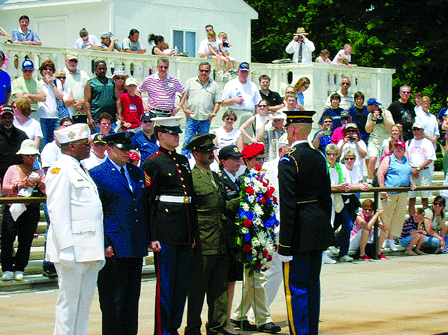Following Pres. Bush’s speech, gay veterans lay wreaths and march with others
On Memorial Day at Arlington National Cemetery’s Tomb of the Unknowns, a gay veterans group, the American Veterans for Equal Rights, participated in the official ceremony led by the nation’s commander in chief, Pres. George W. Bush, that honors those fallen in combat.
“We want to bring recognition to the fact that we are serving regardless of whether you want us or not,” said the gay group’s national president, A.J. Rogue, a former Navy corpsman. “We know there’s a lot of gays and lesbians that have died over the years. Many without recognition, and without the knowledge of who they were.”
American Veterans for Equal Rights advocates for the equal treatment of active and retired gay and is lesbian service members, and is active in the struggle to overturn the military’s ban on gay and lesbians serving openly in the armed forces.
Just across the Potomac River in Virginia, within sight of the Capitol, the Tomb of the Unknowns occupies a stately site in Arlington National Cemetery, the final resting place of more than 280,000 fallen men and women in uniform since the Civil War, when the land was requisitioned to inter the burgeoning numbers of dead troops.
With Americans engaged in combat abroad—with some of the fallen from Iraq and Afghanistan now buried at Arlington—as well as an election season that pitted same-sex marriage alongside the war on terror in the presidential campaign, it was poignant that a gay rights group would actively participate in a state ritual steeped in tradition and patriotic reverence.
Each Memorial Day, the president lays a wreath at the Tomb, and then addresses the crowd gathered in an adjoining amphitheater. Just before his arrival, members from two dozen veterans services organizations carry American flags and their organizations’ banners down the ramp into the theater’s well, and then line the walls to either side of the stage.
Following the presidential address, each group lays a wreath at the Tomb.
This is the fifth year AVER has laid a wreath, but the first in which they were part of the “colors procession” as it is called.
A contingent of four retired gay veterans – Navy Corpsman A.J. Rogue, Marine Sgt. Spencer Layton, Senior Airman Tony Smith, and Army Sgt. Stacy Vasquez – expressed pride in representing all gay veterans, but were also quick to point out the emphasis was really not on gay rights or making a political statement.
“Today is about Memorial Day. It’s about honoring all veterans. That’s why we’re not carrying a rainbow flag, we’re carrying a U.S. flag and our organizational flag. We’re veterans first, and we’re not different from any other veteran,” said Tony Smith, executive director of the Military Community Services Network, another gay veterans advocacy group.
“The rainbow isn’t important today. There’s a time and place for that. This isn’t it. We’re recognizing all veterans today, as well as gay veterans,” Rogue added.
Many gay rights activists, chary to criticize fellow gays, nonetheless discreetly question why gays and lesbians should work to overturn the ban on joining an organization that engages in warfare. Why would a young, perhaps closeted, gay man or lesbian seek to go into harm’s way and submit to the discipline of officials sworn to obey a law that discriminates against them?
For men like Rogue, who calls himself a patriot, the right to join the military is as sacred as those contained in the Bill of Rights—a distinctly American attribute to be able to determine one’s own fate and contribute fully to the national community without having to hide.
“It’s part of our right as American citizens, just like anybody else…Our government shouldn’t tell us whether we can or not. It should be an individual’s choice,” Rogue said.
In remarks to the same audience President Bush would later address, General Richard Myers, Chairman of the Joint Chiefs of Staff, called those men and women fighting in Iraq and Afghanistan “America’s new ‘Greatest Generation,’” a term applied to those Second World War veterans who fought and defeated the Axis Powers.
Because of the universal draft of 18-35 year-old-men in that era, others have referred to the U.S. armed services at the time as the single greatest collection of gays in one organization in the nation’s history, many of whom went on to earn battle decorations and serve with distinction.
Three gay veterans of America’s current foreign wars join the ranks of distinguished service members: Marine Corporal Jeff Key, who recently completed a Iraqi tour of duty; Army Sgt. Robert Stout, awarded a Purple heart for being wounded by grenade shrapnel while on patrol in Iraq; and Army Ranger Sgt. Brian Hughes, a member of the commando unit that rescued Private Jessica Lynch from her Iraqi captors. Stout has been discharged from the Army for violating the military’s ban on publicly divulging his homosexuality.
Experts estimate that 35,000 gays and lesbians now serve in the U.S. military.
In another of the Arlington celebration’s ironic turns, one of the color-bearing members of American Veterans for Equal Rights, former Army Sgt. Stacy Vasquez, was a plaintiff in a lawsuit filed last year by the Service Members Legal Defense Network, another gay advocacy group, to overturn the military’s gay ban.
In 2003, Vasquez was discharged from the Army after a co-worker’s wife reported her for kissing another woman. “Everybody thinks we’re fighting for the right to serve. What we’re fighting for is the right to say we’re gay, and it doesn’t matter,” Vasquez said.
gaycitynews.com



































